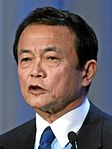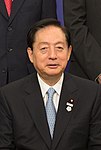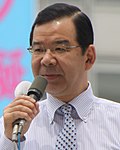Japanese general election, 2009
Japanese general election, 2009

|
|
|
|
|
|
All 480 seats to the House of Representatives of Japan
241 seats needed for a majority
|
| Turnout |
69.28% |
| |
First party |
Second party |
Third party |
| |
 |
 |
 |
| Leader |
Yukio Hatoyama |
Tarō Asō |
Akihiro Ota |
| Party |
Democratic |
Liberal Democratic |
New Kōmeitō |
| Leader since |
16 May 2009 |
22 September 2008 |
30 September 2006 |
| Leader's seat |
Hokkaidō-9th |
Fukuoka-8th |
Tokyo-12th (lost) |
| Last election |
113 seats
36.44% (district)
31.02% (block) |
296 seats
47.77% (district)
38.18% (block) |
31 seats
1.44% (district)
13.25% (block) |
| Seats before |
115 |
300 |
31 |
| Seats won |
308 |
119 |
21 |
| Seat change |
 193 193 |
 181 181 |
 10 10 |
| Popular vote |
33,475,334 (district)
29,844,799 (block) |
27,301,982 (district)
18,810,217 (block) |
782,984 (district)
8,054,007 (block) |
| Percentage |
47.43% (district)
42.41% (block) |
38.68% (district)
26.73% (block) |
1.11% (district)
11.45% (block) |
|
| |
Fourth party |
Fifth party |
Sixth party |
| |
 |
 |
 |
| Leader |
Kazuo Shii |
Mizuho Fukushima |
Yoshimi Watanabe |
| Party |
Communist |
Social Democratic |
Your |
| Leader since |
24 November 2000 |
15 November 2003 |
8 August 2009 |
| Leader's seat |
Minami-Kantō PR |
not contesting (Coun.) |
|
| Last election |
9 seats
7.25% (district)
7.25% (block) |
7 seats
1.46% (district)
5.49% (block) |
new party |
| Seats before |
9 |
7 |
4 |
| Seats won |
9 |
7 |
5 |
| Seat change |
0 |
0 |
 1 1 |
| Popular vote |
2,978,354 (district)
4,943,886 (block) |
1,376,739 (district)
3,006,160 (block) |
615,244 (district)
3,005,199 (block) |
| Percentage |
4.22% (district)
7.03% (block) |
1.95% (district)
4.27% (block) |
0.87% (district)
4.27% (block) |
|
| |
Seventh party |
Eighth party |
Ninth party |
| |
PNP |
 |
 |
| Leader |
Tamisuke Watanuki |
Yasuo Tanaka |
Muneo Suzuki |
| Party |
People's New |
New Party Nippon |
New Party Daichi |
| Leader since |
17 August 2005 |
21 August 2005 |
18 August 2005 |
| Leader's seat |
Hokuriku-Shin'etsu PR |
Hyōgo-8th |
Hokkaidō PR |
| Last election |
4 seats
0.64% (district)
1.74% (block) |
1 seats
0.20% (district)
2.42% (block) |
1 seats
0.02% (district)
0.64% (block) |
| Seats before |
4 |
0 |
1 |
| Seats won |
3 |
1 |
1 |
| Seat change |
 1 1 |
 1 1 |
0 |
| Popular vote |
730,570 (district)
1,219,767 (block) |
220,223 (district)
528,171 (block) |
- (district)
433,122 (block) |
| Percentage |
1.04% (district)
1.73% (block) |
0.31% (district)
0.75% (block) |
- (district)
0.62% (block) |
|

|
|
Parliamentary districts won by |
|

Taro Aso
Liberal Democratic
Yukio Hatoyama
Democratic
A general election for the Japanese House of Representatives was held on August 30, 2009. The opposition Democratic Party (DPJ) defeated the ruling coalition (Liberal Democratic Party (LDP) and New Komeito Party) in a sweeping victory, winning 221 of the 300 electoral districts and receiving 42.4% of the proportional block votes for another 87 seats, a total of 308 seats to only 119 for the LDP (64 districts and 26.7% of the proportional votes).
Under Japan's constitution, this result virtually assured DPJ leader Yukio Hatoyama would be the next Prime Minister of Japan. He was formally named to the post on September 16, 2009. Prime Minister Taro Aso conceded late on the night of August 30, 2009 that the LDP had lost control of the government, and announced his resignation as party president. A leadership election was held on September 28, 2009.
The 2009 election was the first time since World War II that voters mandated a change in control of the government to an opposition political party. It marked the worst defeat for a governing party in modern Japanese history, was only the second time the LDP lost a general election since its formation in 1955, and was the first time that the LDP lost its status as the largest party in the lower house; the only other break in LDP control since 1955 had been for a 3-year period from 1993 to 1996 (first 11 months in opposition, then participating in a coalition government under a Socialist prime minister).
...
Wikipedia









